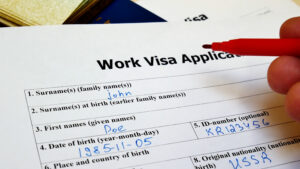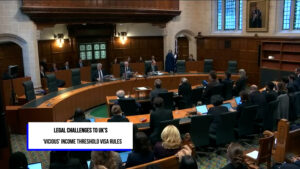By Rodaportal
INTRODUCTION
The groundbreaking 5-point plan unveiled by Home Secretary James Cleverly marks a pivotal moment in the transformation of the UK’s immigration landscape. This comprehensive plan promises significant modifications, affecting income thresholds and visa rules with vast implications for businesses, employees, and the legal system’s fundamental structure.
In this article, we will provide you with a detailed exploration of Cleverly’s game-changing plan, dissecting its nuances and anticipating the far-reaching impacts it may have. Additionally, we’ll shine a spotlight on the contentious income threshold visa rules, examining the legal challenges they’re up against.
So, fasten your seatbelts as we navigate through the intricate terrain of UK immigration, decoding the implications of Cleverly’s plan and shedding light on the legal intricacies surrounding the vicious income threshold visa rules. Stay with us for an insightful journey into the dynamic and rapidly evolving world of UK immigration!

James Cleverly’s 5-Point Plan: A Closer Look
The Home Secretary’s 5-point plan on immigration policy is set to bring about significant changes that businesses and employees must brace themselves for. The plan includes a marked increase in the default minimum base salary threshold for Points-Based System Skilled Workers, restrictions on dependents for those below the threshold, and a review of the “shortage occupation list.” These changes are poised to create waves of impact across various sectors.
The most pivotal change is the surge in the default minimum base salary threshold from £26,200 to £29,000. This increase aims to set a higher income standard for skilled workers and signals a shift in the government’s approach to immigration. Businesses and employees must prepare for the repercussions of this move. A new £38,700 visa rule will be introduced in early 2025, Rishi Sunak has said.

Another notable change is the limitation imposed on Skilled Worker migrants, preventing them from bringing dependents if their base salary falls below the increased threshold. This restriction could significantly impact staffing and recruitment, particularly in critical sectors such as health and social care.
Furthermore, the plan includes a thorough examination of the “shortage occupation list,” which currently allows a 20% reduction in the minimum salary threshold for specific roles. The potential removal of this provision introduces an element of uncertainty for businesses relying on the list to fill critical positions, potentially exacerbating labour shortages.
Impact on NHS Staff Shortages
The healthcare sector is facing multiple challenges due to recent changes in immigration policies. The fear of exacerbating NHS staff shortages has arisen due to the rise in the minimum salary requirement and the removal of the shortage occupation list, which may hinder the recruitment of crucial healthcare professionals, resulting in a potential compromise of patient care.
Moreover, social care workers are facing specific challenges due to the prohibition of bringing dependents when coming to work in the UK. As there are already 152,000 care worker vacancies in England, this restriction may worsen the existing challenges in delivering adequate care, potentially compromising the well-being of residents.

Concerns from Industry Leaders and Legal Implications
Several industry leaders, including Martin Green, the chief executive of Care England, have expressed concern over the government’s approach, which they believe is making it increasingly difficult for care providers to recruit foreign workers. These leaders are calling for swift investment in improving pay and conditions to address the urgent need for a comprehensive strategy in resolving the social care workforce crisis.
The government’s recent package, which it claims is the most extensive clampdown on legal migration, has significant legal and policy implications, particularly in the healthcare sector. The potential fallout of reducing workers and their dependents in health and social care routes, as outlined in the Home Office calculations, adds complexity to an already contentious issue.
In this rapidly evolving scenario, it is critical to monitor the impact of Cleverly’s 5-point plan on the healthcare sector and the potential legal challenges it may face. The delicate balance between immigration controls and maintaining essential services, particularly in healthcare, will shape the narrative in the coming months.

Anticipated Impacts on Businesses and Employees
The sudden shift in policy has created challenges for businesses that have previously adopted their 2024 recruitment plans based on certain assumptions. Several sectors, such as those that faced skill level and salary threshold reductions post-Brexit, are now required to recalibrate their staffing strategies. For instance, the health and care sector is one such industry where sponsored care workers are still permitted to receive lower salaries. Still, the restriction on bringing dependents unless they earn £29,000 or more may pose potential staffing challenges.

Legal Challenges to UK’s ‘Vicious’ Income Threshold Visa Rules
The visa rules based on income thresholds have generated considerable opposition. Some have begun to consider legal action to challenge the perceived cruelty of these regulations. Critics contend that these rules could wreak havoc on the economy and are preparing to take the issue to court. As these legal challenges develop, the intricacies of the cases will be crucial to monitor as they may shape the future course of immigration policy.

Conclusion
In response to the record-breaking immigration figures released by the Office for National Statistics in November, James Cleverly has proposed a 5-point plan. While these changes are likely to stir discontent among UK businesses, they could provide reassurance to those expressing concerns about the impact on local wages and the sheer volume of visas granted.
However, the plan is not without its controversies. There are ongoing concerns about the possible misuse of the health and care visa, with doubts remaining over the effectiveness of the Care Quality Commission requirement in addressing this issue. Additionally, there has been a significant hike in the financial requirement for the family route, which is expected to create controversy among family rights campaigners.

The true implications of Cleverly’s plan will unfold over time, shaping the discourse on immigration, business dynamics, and social issues.
So, if you found this analysis insightful, don’t forget to hit the like button and subscribe for continuous updates.
For a deeper dive into the intricacies of James Cleverly’s proposed plan and its impact on immigration policies, watch my YouTube video titled “The End of Pro Migration Policies – UK James Cleverly 5-Point Plan.” Click [here] to access the video.
Remember, Stay informed, stay engaged, and be a part of the ongoing conversation.
